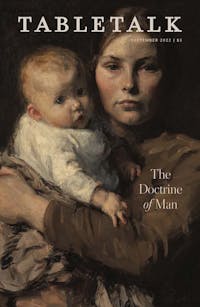
Request your free, three-month trial to Tabletalk magazine. You’ll receive the print issue monthly and gain immediate digital access to decades of archives. This trial is risk-free. No credit card required.
Try Tabletalk NowAlready receive Tabletalk magazine every month?
Verify your email address to gain unlimited access.
In 2020, a Nevada schoolteacher informed her class that they had to declare their various identities and characteristics, which were then scored according to their “privilege” or “oppression.” To identify as either white or Christian was defined as oppressive. Students were asked to “undo and unlearn” their “beliefs, attitudes, and behaviors that stem from oppression.” One student, William Clark, knew that something was wrong with being told to “unlearn” Christianity. But he was threatened with a failing grade and nongraduation if he failed to comply.
That classroom activity was one practical application of critical race theory, which is one of the most contentious issues in society and in the church today. In the name of “antiracism,” many schoolchildren are being encouraged to see everything in racial categories. Asking children to see themselves, and others, as either guilty of privilege or victims of oppression is divisive in the extreme.
The Bible shines a bright light onto this divisive ideology. Scripture teaches the unity of the human race (Gen. 1:26; 7:21; 10:32; Matt. 19:4; Acts 17:26; Rom. 5:12–21; 1 Cor. 15:21–28, 45–49). We are all more related to one another than most people imagine. There are no absolute identities of “black” or “white.” Yet acknowledging our essential unity as humans does not mean that variety in ethnicity and culture cannot also be respected. God is glorified as the diversity of peoples come together to honor Him (Rev. 5:9).
In a fallen world, injustice, abuse, and exploitation are ugly realities (Eccl. 4:1; Rom. 3:9–19). The sense that this is wrong is God-given. Our just and righteous Creator has placed His moral law on our hearts (Rom. 1:18–32; 2:14–16). Our desire for justice attests that we have been created in His image.
Often, Christians have been in the forefront of insisting that all should be educated, since all should have access to the Word of God. The biblical conviction that every human being is to be treated with respect lay behind efforts to abolish slavery. The liberties and rights that we value in free societies are based on the conviction that all humans, made in God’s image, are equal in dignity.
Despite all this, many today regard Christianity as oppressive. Instead, critical race theory is inculcated by means of sensitivity training, unconscious bias training, and diversity, equity, and inclusivity programs. But seeking justice on the basis of a worldview that has rejected God only ever makes things worse. Critical race theory is an offshoot of critical theory, a school of thought that set out to destroy all claims to transcendent truth. Hostility to biblical Christianity was, and is, part of its DNA. Traditional disciplines (science, history, etc.) have sought to understand the world as it is. But critical theory is about how to change the world to achieve equity (i.e., equal outcomes rather than equal opportunities). Critical theory is about destabilizing society by persuading people to view all authority as oppressive, all truth claims as suspicious, and all words as ultimately meaningless. Critical theory holds that universal explanations, moral codes, religion, and even legal codes, reason, logic, and science are just the means by which the privileged protect their position and keep the oppressed down.
This destructive project began in the universities, but it has captured all the major institutions of the West. Society is fractured into groups as people are pitted against each other in an arms race of victimhood. Individual moral responsibility is downplayed as guilt is seen in collective terms. Privilege is regarded as a sin that can never finally be expunged. Humanity is divided between some who have access to certain experiences and others who don’t and therefore can’t understand the experiences of the other group. This denies our capacity to engage with others. It shuts off the God-given ability to communicate with and trust our fellow human beings. This is a wretched restriction on social interactions. It’s also an outcome of denying God as the source of external and universally available truth.
The Bible teaches us that God is the giver of life, that every human is created in His image, and that when we neglect or despise our fellow human beings, we insult their Maker (Prov. 14:31; 17:5). The only certain guarantee of human freedom and dignity is belief in our creation by God. Evolutionary ideas lay directly behind the flawed “science” of eugenics, which in turn fed into the evil idea of racial supremacy.
To view people primarily according to the groups to which they belong reduces the likelihood of respecting them for who they are. The universal respect due to all humans is lost. The particular respect due to individuals because of their own character, virtue, or achievement is lost as well. The biblical truths of creation and redemption point to the essential unity of the human race and to the respect to be afforded to each individual.
The Bible teaches us that we are all sinners; we are all morally responsible; we can all be forgiven. When we have acknowledged our own sinfulness and experienced God’s forgiveness, we are empowered to forgive others. At a time of polarization and social division, the capacity to demonstrate humility and forgiveness is countercultural and beautiful.
It is right to seek justice and oppose racism. But the biblical worldview is the only firm foundation for the defense of human dignity and societal harmony. To compromise with an ideology that sets out to destroy transcendent truth claims is catastrophic. We rejoice to proclaim that our triune God is the ground of truth, justice, and morality. He is worthy of the praise of everyone in every nation and in every age (Ps. 72:8–11).
